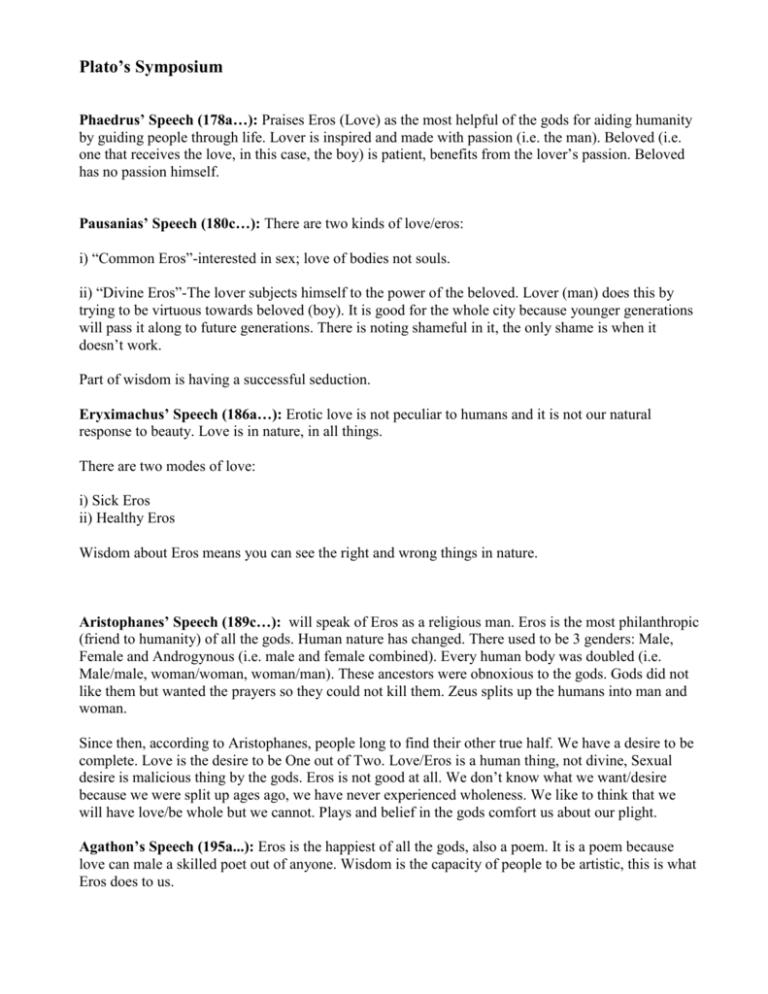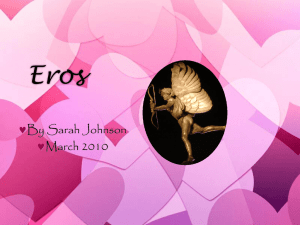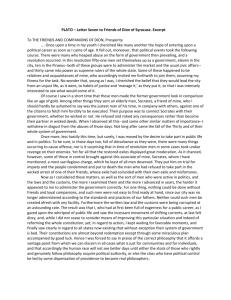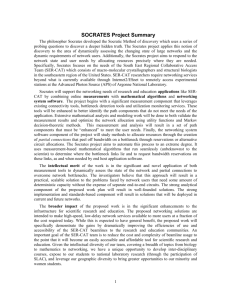
Plato’s Symposium
Phaedrus’ Speech (178a…): Praises Eros (Love) as the most helpful of the gods for aiding humanity
by guiding people through life. Lover is inspired and made with passion (i.e. the man). Beloved (i.e.
one that receives the love, in this case, the boy) is patient, benefits from the lover’s passion. Beloved
has no passion himself.
Pausanias’ Speech (180c…): There are two kinds of love/eros:
i) “Common Eros”-interested in sex; love of bodies not souls.
ii) “Divine Eros”-The lover subjects himself to the power of the beloved. Lover (man) does this by
trying to be virtuous towards beloved (boy). It is good for the whole city because younger generations
will pass it along to future generations. There is noting shameful in it, the only shame is when it
doesn’t work.
Part of wisdom is having a successful seduction.
Eryximachus’ Speech (186a…): Erotic love is not peculiar to humans and it is not our natural
response to beauty. Love is in nature, in all things.
There are two modes of love:
i) Sick Eros
ii) Healthy Eros
Wisdom about Eros means you can see the right and wrong things in nature.
Aristophanes’ Speech (189c…): will speak of Eros as a religious man. Eros is the most philanthropic
(friend to humanity) of all the gods. Human nature has changed. There used to be 3 genders: Male,
Female and Androgynous (i.e. male and female combined). Every human body was doubled (i.e.
Male/male, woman/woman, woman/man). These ancestors were obnoxious to the gods. Gods did not
like them but wanted the prayers so they could not kill them. Zeus splits up the humans into man and
woman.
Since then, according to Aristophanes, people long to find their other true half. We have a desire to be
complete. Love is the desire to be One out of Two. Love/Eros is a human thing, not divine, Sexual
desire is malicious thing by the gods. Eros is not good at all. We don’t know what we want/desire
because we were split up ages ago, we have never experienced wholeness. We like to think that we
will have love/be whole but we cannot. Plays and belief in the gods comfort us about our plight.
Agathon’s Speech (195a...): Eros is the happiest of all the gods, also a poem. It is a poem because
love can male a skilled poet out of anyone. Wisdom is the capacity of people to be artistic, this is what
Eros does to us.
Socrates’ Speech (201d…): Socrates’ speech begins with a refutation of Agathon’s. Love is not
happy or beautiful. Socrates asks Agathon whether love is the love of something or nothing. Agathon
replies something. Socrates then asks if love is a relation out of the self to the other. Agathon replies
yes. Socrates yet again asks whether or not we desire what we love. Agathon says yes. Does a lover
need what she/he desires, asks Socrates. Yes, says Agathon. Socrates then asks if a love needs what he
has. Agathon replies no. So, Socrates concludes, love is desire for something we lack but do not have.
Eros therefore is not a happy because it is an empty longing for what we ultimately lack.
Socrates then tells the story of Diotima, the priestess who instructed Socrates about love.
There is an intermediate connection between beautiful/ugly and good/evil. This connection is spiritual
which occupies the intermediate zone between beautiful/ugly and good/evil. Eros is a spiritual being,
not a god.
Eros’ father = Poros (Resource)
Eros’ Grandmother = Metis (Cunning)
Eros’ Mother = Penia (Poetry)
Eros is tough, shrivel, homeless. But also cunning, resourceful, etc.
The philosopher is spiritual, not good or wisw.
Diotima: “What do you achieve when you have beauty?” “Happiness?”
Socrates: The good.
D: Beauty (symbol of the good) is a promise of happiness.
There is a reason we love those that we love. It is because we seek an adequate knowledge partner.
People love the good. Love is wanting to possess the good forever.
Every one of us is always already pregnant we need sexual desire to help us give birth. Pregnancy can
be matter of souls (poets, philosophers) or bodies (sexual desires).
Philosophers give birth to ideas.
the erotic development of the philosopher:
-beauty of many bodies
-beauty of abstract ideas
-beauty of though
Each of these steps is closer to the Good, but also dissatisfaction. But, sometimes philosophers are able
to grasps the form of beauty, the idea of beauty.
Alcibiades’ speech (214e…): Alcibiades is in love with Socrates.Gives a speech praising Socrates.
Thinks Socrates is like a saline statue (i.e. think Russian dolls). No sooner do you think you get
Socrates when you find out there are more layers, more masks underneath.
It is uncanny that Socrates can make Alcibiades unsatisfied with his life. Alcibiades gets a weird
feeling that Socrates makes him feel ashamed.
Socrates loves beautiful boys, yet at the same time Socrates does not have sex with them, Socrates’
whole life is a game, it is irony. (Do not use this as an example of Socratic Irony in your papers!)
Socratic Irony:
Simply irony: Literally false. Mean something different, opposite from what is meant.
Socratic Irony: Both is and is not meant. True in one way, false in another.
Alcibiades accounts a failed attempt at trying to seduce Socrates:
Alcibiades tries to make a trade, sex for philosophical guidance (does not work) Next he tries
wrestling (does not work), then he tries to get Socrates drunk and it does not work.
These failed attempts have made Alcibiades; passion more inflamed. Alcibiades shows us how badly
astray a sexual desire can lead us (drunkenness, troublemakers, etc).
Socrates wants love to be more than an inarticulated longing. Does not teach anything anyone that they
do not already know. Alcbiades is an unattractive pupil for Socrates, Alcibiades cannot shake his love
for Socrates, he is beginning to glimpse of a higher beauty.







